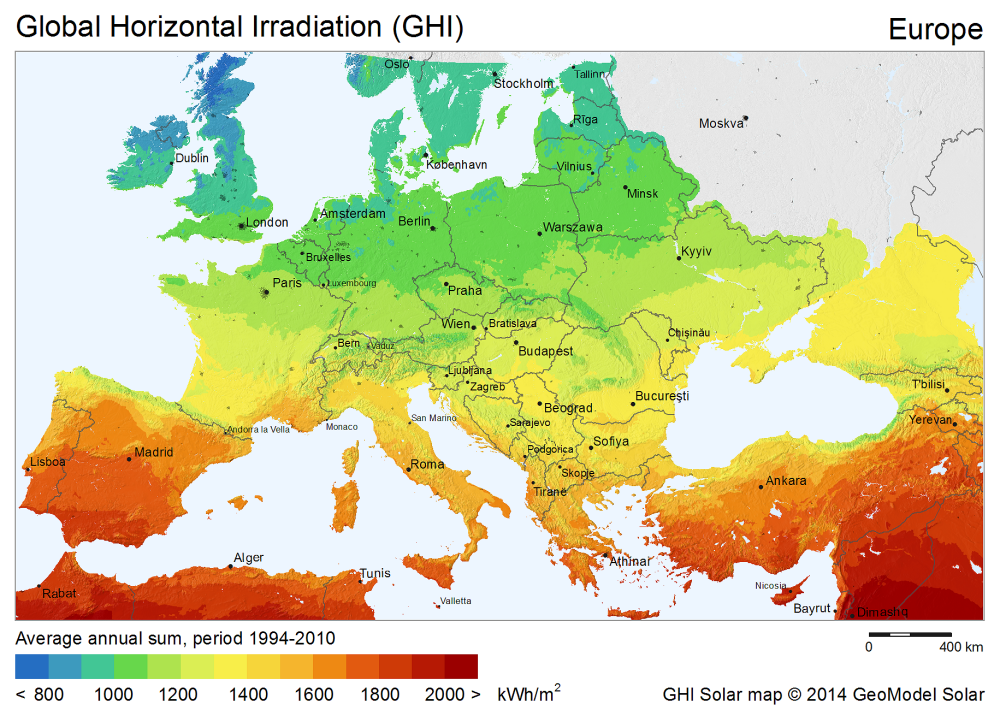|
Has any research been done on marrying nuclear fuel with a fuel cell type set-up instead of using steam pressure to push a big ol' turbine? Or are the energy savings of fuel cells inherent to eliminating the 'combustion' step of the cycle and thus not useful when using nuclear fuel?
|
|
|
|

|
| # ? May 3, 2024 08:10 |
|
spankmeister posted:Depends on your definition. In Chernobyl the reactor DID explode, and at Fukushima the reactors remained more or less intact, but (hydrogen) explosions DID occur. I mean atomic explosions, not hydrogen explosions. Atomic "Level-the-earth-within-500-km" explosions, since "everybody knows new nuclear is much more powerful than hiroshima!"
|
|
|
|
Flaky posted:Has any research been done on marrying nuclear fuel with a fuel cell type set-up instead of using steam pressure to push a big ol' turbine? Or are the energy savings of fuel cells inherent to eliminating the 'combustion' step of the cycle and thus not useful when using nuclear fuel?
|
|
|
|
Aureon posted:I mean atomic explosions, not hydrogen explosions. Yeah gotcha. Man this reminds me about a discussion about nuclear power in I think it was Real Time with Bill Maher. This woman is against nuclear reactors because they are totally "slow-motion nuclear explosions". Yes that is exactly what is happening inside a nuclear reactor, lady, you nailed it!
|
|
|
|
Farmer Crack-rear end posted:I've been wondering for awhile why we couldn't just stick waste casks in former chemical weapons depots. I mean you've already got these bunker complexes out in the middle of nowhere, they've already been built with the intent of containing much more hazardous substances, why not repurpose them and get more utility out of them now that we're destroying our chemical weapons stockpiles? The view of chem weapons depots as a bunker on a tundra hundreds of miles from any human civilization worth claiming would probably be taken as an insult by the citizens of Anniston, Alabama. spankmeister posted:Yeah gotcha. You wanna blow her mind, tell her the secret about internal combustion engines that Big Oil and the Big Automakers don't want you to know
|
|
|
|
Flaky posted:Has any research been done on marrying nuclear fuel with a fuel cell type set-up instead of using steam pressure to push a big ol' turbine? Or are the energy savings of fuel cells inherent to eliminating the 'combustion' step of the cycle and thus not useful when using nuclear fuel? I am not aware of utilizing fuel cells to store heat-derived energy, and, to be honest, i fail to see the advantages. e: Did a bit of research, nothing planned for short time, but hydrogen cells may come in handy in the future, since very high temperatures are attainable. Security risks to check, since the modulators usually don't interact too well with hydrogen. Aureon fucked around with this message at 16:29 on Sep 19, 2012 |
|
|
|
Nuclear waste is a common topic. There are ways to destroy this stuff permanently: http://en.wikipedia.org/wiki/Nuclear_transmutation Essentially you use nuclear physics to change the nuclei of isotopes you don't like. If you irradiate waste with neutrons of the right energy, you can force them to capture the neutrons, which turns them into a different isotope. A single neutron can mean the difference between something needing thousands of years to stabilize and something that stabilizes so fast it's difficult to measure accurately. That's how you deal with most fission products. The only exceptions which are present in high amount are Sr-90 and Cs-137. But these guys don't last long (300 years for 10 half lives) and only make up ~20% of your total waste mass. They're also easy to isolate and manage from everything else. With transuranics, you irradiate them to create "fissile" isotopes out of them. That basically means that the next neutron that hits them is likely to cause a fission event. The process is sometimes dubbed "transmuting into oblivion". Generally, odd-numbered isotopes are fissile. The big 4 that produce an excess of neutrons are U-233, U-235, Np-237, Pu-239, with everything else producing less than 2 neutrons. It gets a lot more complicated than that but suffice to say if you can fission any of those big 4 with high efficiency, you're left with more than enough neutrons to burn surrounding transuranic waste. You also avoid creating new transuranics if you ensure the highest possible fission efficiencies with your fuel. This all depends on how slick your reactor is. What's most likely to happen is we'll use "plasma furnaces" to destroy our waste. Basically, we use highly neutron-dense fusion reactors to produce all the neutrons needed to transmute things. The issue is that such reactors will be energy hogs and quite expensive to operate, but they'll also be able to do a lot more than just burn waste. This is basically what a couple companies in China is planning to do: http://www.world-nuclear.org/info/default.aspx?id=26187&terms=china quote:Wastes In the meantime though, that waste can't sit in cooling ponds forever. That's where our decision on dry casking and repositories come into play. It's not to say the waste will stay in casks forever, just that we're not done developing the systems we'll need to destroy them permanently so this is something we can do in the meantime that's much more secure.
|
|
|
|
Flaky posted:Has any research been done on marrying nuclear fuel with a fuel cell type set-up instead of using steam pressure to push a big ol' turbine? This is very speculative, though, because the automotive fleet switchover would take decades and hydrogen itself is a pain-in-the-rear end to distribute. For the present, any new nuclear power plants should be used to retire coal-fired power plants.
|
|
|
|
GulMadred posted:Some proposed reactor designs operate at very high temperatures, and might be capable of thermally dissociating water (rather than suffering the inefficiencies of heat -> steam -> turbine -> generator -> electricity -> electrolysis). The liberated hydrogen could then be captured, shipped around the world (in a hypothetical distribution grid) and used in automotive fuel cells as an alternative to biofuels or (expensive+heavy) batteries. Generally speaking the 'hydrogen economy' is a pipe dream at best. The round trip efficiency of energy generation -> hydrogen generation -> storage -> distribution -> consumption is so low that the costs are prohibitively high. Accepting that, adopting hydrogen as a system would require a fundamental shift in how the American economy functions, and there's just no will to make that happen. The closest approximation would be the adoption of the interstate system. It was a huge public works project that redefined the American economy, but it made use of an already widely accepted and adopted technology (combustion engines versus fuel cells) and filled a gaping need that was not being met (conventional trucks and cars still work just fine for now). It could work, and the biggest plus would be allowing massive integration of renewables into the grid. Make hydrogen with wind in Iowa, pipe it to Chicago, stick it in your car, drive to work. It would just require a distribution network larger than that of the current gasoline distribution system, would force non-incremental transportation technology adoption, and even then would be so expensive it would bust our wallets. The need to be incremental is what draws many people to the electric car as the solution to the transportation quandary. It's impossible to draw a gradual path from our current system to a hydrogen economy, but doing so to electric is easy. Start with hybrid systems, gradually phase in more charging electric cars. Adopt subsidies for them to encourage adoption for the 20-30 minute a day commuter. The transmission system for electricity already exists, so all we need is to add the ability to charge. As capacitor technology improves gradually phase out hybrid combustion engines and create quick-charging stations to mimic gasoline stations (this part is definitely the trickiest, but imagining a better or faster-charging battery is a lot easier than imagining a huge network of hydrogen stations). Luckily hydrogen does have its place as a fuel source. It's tailor made for enclosed spaces where you need a high-usage vehicle but don't want emissions (think forklifts in warehouses) or for fleets of vehicles that stay near convenient refueling stations (buses, taxis, shipyard movers, etc). Natural Gas fuel cells still very much have the edge here though, and unless costs go up significantly for natural gas in the next decade or so (unlikely) these applications will remain niche and you'll see a lot more "This bus runs on clean burning natural gas!!" signs than "This bus runs on wind energy!!" signs.
|
|
|
|
GD_American posted:You wanna blow her mind, tell her the secret about internal combustion engines that Big Oil and the Big Automakers don't want you to know There aren't any literal explosions in an internal combustion engine but I understand the point you are making. Edit: unless you mean deflagration jfreder fucked around with this message at 17:27 on Sep 19, 2012 |
|
|
|
jfreder posted:There aren't any literal explosions in an internal combustion engine but I understand the point you are making. Edit: unless you mean deflagration Rapid combustion that emits a gas pressure wave is literally an explosion.
|
|
|
|
jfreder posted:There aren't any literal explosions in an internal combustion engine but I understand the point you are making. No, you're wrong, they are explosions e: NUKULAR EXPLOSIONS  fake e: Yeah I think you're right actually. spankmeister fucked around with this message at 20:03 on Sep 19, 2012 |
|
|
|
Yes, not detonation explosions, but still explosions.
|
|
|
|
Natural gas is still in a massive glut, right? Last I heard from family in PA was they were capping wells left and right until prices rose.
|
|
|
|
GD_American posted:Natural gas is still in a massive glut, right? Last I heard from family in PA was they were capping wells left and right until prices rose. We should have enough for 50-100 years. Figure is very variable though (If oil's out, gas will be used in it's role, thus ending much more quickly) Gas still fucks over the climate, though. And produces a shitton of cancerous stuff. Which is why we need to cut fossils, in the coal-oil-gas order.
|
|
|
|
A discussion on electricity generation isn't complete without magnetostriction!Wikipedia posted:Internally, ferromagnetic materials have a structure that is divided into domains, each of which is a region of uniform magnetic polarization. When a magnetic field is applied, the boundaries between the domains shift and the domains rotate, both of these effects cause a change in the material's dimensions. That buzzing hum that you hear when standing next to a transformer is actually the sound of the metals inside the field rapidly and minutely changing their dimensions. It turns out that the effect works in the reverse as well - when you stretch or compress or twist a piece of metal you can physically re-orient the internal magnetic domains, causing a magnetic field to generate around the metal, and a wire moving through this field will carry a current! You wouldn't notice the effect with most metals, however there are a few alloys that are really good at magnetostriction. Terfenol-D is used as a super-precise actuator (by applying a field to change the dimensions of the metal, not the reverse), Metglas is seeing some research in MEMS, and Galfenol is under investigation for electricity generation potential. Imagine being able to charge your phone simply by walking down the street in your magnetostrictive alloy-equipped EnerBoots(tm)!
|
|
|
|
Germany's gone a lot of the way towards having most of their grid powered by renewables, at least in theory. In practice it's causing very severe problems.
|
|
|
|
-Troika- posted:Germany's gone a lot of the way towards having most of their grid powered by renewables, at least in theory. In practice it's causing very severe problems. That article seems outright horrible, from referring to environmentalists as "rabid" and referring to a "warmist cause" to implying that there are people who don't understand that wind farms aren't a consistent supply of energy (at least I hope there aren't people who are that dumb). I mean . . . with a quote like "Like all enthusiasts for “free, clean, renewable electricity”, they overlook the fatal implications of the fact that wind speeds and sunlight constantly vary" I think you just immediately know where the author's bias lies. And there doesn't seem to be any sourcing of any kind, particularly interesting when you're claiming that the carbon emissions advantage is completely negated by having to compensate for the unreliability of wind/solar. The author pretty much sounds like a global warming denier based on the other stuff he's written, as well. (And there are hints of opposition to marriage equality  .) .)
|
|
|
|
TheQat posted:That article seems outright horrible, from referring to environmentalists as "rabid" and referring to a "warmist cause" to implying that there are people who don't understand that wind farms aren't a consistent supply of energy (at least I hope there aren't people who are that dumb). I mean . . . with a quote like "Like all enthusiasts for “free, clean, renewable electricity”, they overlook the fatal implications of the fact that wind speeds and sunlight constantly vary" I think you just immediately know where the author's bias lies. It's an opinion piece in the freaking Telegraph - just assume it's all lies, that's probably closest to the truth. On the topic of the UK and wind power, Great Britain and Ireland just got joined by a 500MW power cable. The cable will help stabilize the grid for wind by allowing exports between the two countries (primarily from Ireland to Great Britain) resulting in a greener energy mix. According to the article, roughly 20% of the build cost was covered by an EU grant, so that's nice too.
|
|
|
|
-Troika- posted:Germany's gone a lot of the way towards having most of their grid powered by renewables, at least in theory. In practice it's causing very severe problems. I didn't read the article, but I do know that Germany is now importing significantly more power from France, so mostly nuclear power. A lot of people were predicting that this would be the end result when Germany declared that they were shutting down all of their nuclear power plants, and that's exactly what happened. They're doing an admirable job of using as many renewables as they can, but it's simply not enough.
|
|
|
|
TheQat posted:The author pretty much sounds like a global warming denier based on the other stuff he's written, as well. (And there are hints of opposition to marriage equality Wikipedia posted:Christopher John Penrice Booker (born 7 October 1937) is an English journalist and author. He has been a columnist for The Sunday Telegraph since 1990. He has taken a stance which runs counter to the scientific consensus on a number of issues, including global warming, the link between passive smoking and cancer, and the dangers posed by asbestos. In 2009, he published The Real Global Warming Disaster, described by The Observer as "the definitive climate sceptics' manual".
|
|
|
|
TheQat posted:That article seems outright horrible, from referring to environmentalists as "rabid" and referring to a "warmist cause" to implying that there are people who don't understand that wind farms aren't a consistent supply of energy (at least I hope there aren't people who are that dumb). I mean . . . with a quote like "Like all enthusiasts for “free, clean, renewable electricity”, they overlook the fatal implications of the fact that wind speeds and sunlight constantly vary" I think you just immediately know where the author's bias lies. Still, we're not types to dismiss arguments ad hominem, are we? Writer may have a terrible track record, but everyone says correct and incorrect things. A broken clock is right two times a day. This may not be the case, but dismissing arguments ad hominem is not warranted. No one has gone "This dirty hippies" on the dreamy ZCA plans before facts were presented. Let's see the claims: (using wikipedia data, but it's all secondary sourced) Germany wind produced in 2011 46,500 GWh, with an installed power of 29MW. Running the numbers, that means 17.9% uptime. He claimed 17, and while technically incorrect, i wouldn't go pants-on-fire on it. quote:The other is that, to keep that back-up constantly available can require fossil-fuel power plants to run much of the time very inefficiently and expensively (incidentally chucking out so much more “carbon” Still, obviously the rate of carbon-reducing for the wind power is, tops, 82%, since the rest of the time the backups are running. The claim is that short-warning plants' efficiency is atleast 25% inferior to continously-running plants. If the backup is "diesel generator", the statement is correct. However, i doubt that'd be the case. Let's assume that somehow, a magical grid can displace the energy from someone else, conveniently selling at market rate and not spot prices, for a 0% efficiency loss. This means that the energy has to go through, assuming a median distance of Paris to Berlin, just 900km. I'm currently unable to find a proper power loss source, but drawing parallels with the Vattenfall statistics which i casually have on hand ( http://gryphon.environdec.com/data/files/6/7310/epd21.pdf ) i would suppose no more than 5%. This claim is unsubstantial, but depending on the realities of the spot market and reserves, plausibile. Further research on the realities of the spot generation is needed. quote:Meanwhile, firms such as RWE and E.on are going flat out to build 16 new coal-fired and 15 new gas-fired power stations by 2020, with a combined output equivalent to some 38 per cent of Germany’s electricity needs. None of these will be required to have “carbon capture and storage” (CCS), which is just an empty pipedream. This makes nonsense of any pretence that Germany will meet its EU target for reducing CO2 emissions (and Mrs Merkel’s equally fanciful goal of producing 35 per cent of electricity from renewables). ]This is a valid claim. [/url] And since our objective is not running renewables for the sake of it, but reducing co2 emissions, we'll try to claim if there was a better mix of 35% renewables 50% coal. We'll leave out the elephant in the room, nuclear: It's not even up for debate that it'd work better, i think. If someone wants to dispute this, i'll run the numbers. Solar energy is to be assumed to be priced at over 27c/KWh. This comes from the Andasol plant in Spain. Obviously, insolation in Germany is lower than in Spain:  We can safely assume a 40% reduction in efficiency, being very, very forgiving. Wind costs are much trickier. We will assume that UK's £0.7b subsides (2010) were enough to put them up to market price (Ignoring backup, grid upgrades, etc, etc, so being very forgiving again) In the UK, 4000MW are installed, at a 25% uptime - netting 8.76 TWh/yr. So, the subsides on a per-KWh basis were 14c. So, the numbers are: (Coal and gas were taken from as many estimates as internet could spit out - Exact numbers are hardly needed, anyway) (no CCS, [CCS] Coal cost - 4-5c/KWh [5-10] Gas cost - 5-6 c/KWh [5-9] We'll assume Gas instead of coal is +1c/KWh. (Or equal, if CCS is applied - but that's not case) Wind is +14c/KWh (forgiving the fact that UK's 25% is not Germany's 18% - this would increase the subside needed by ~25%) Solar is +22c/KWh. The CCS technology is roughly a +3c/KWh, and reduces emissions by 70-90%. Wind is +14c/KWh, and reduces emissions by 100% (ideally, but still.) It's pretty evident that Wind/Solar technology is handily inferior to CCS technology. I do not claim the numbers to be completely correct, but wind's and solar's are pretty solidly based in reality, and underestimated. An argument could be made for reducing the Wind's number, for that many of these subsides were for building: Over 10% of building, while for purely substitution rate one would assume 3%. However, we have forgiven the fact that Germany's wind has a much lower uptime, and the land saturation factor. I do not assume those even each other, but i would reasonably assume the cost of the subsides would be unable to be reduced by over 80%. I'll ignore the "warmists" comments, since they are obviously wrong. In short, i would assume that by luck or anything, the guy has a reasonable chance of being correct. It doesn't take a genius to see that spending in subsides for wind/solar while building non-CCS'd COAL instead of CCS Gas is terrible.
|
|
|
|
Yes. The tone of the article is more than a little grating but the important parts arn't wrong.
|
|
|
|
The company I work for are an EPC (Engineer - Procure - Construct) contractor for multiple power generation sectors and we have recently seen an increase in the quantity of EFW (Energy from Waste) plants and (CHP) Combined heat and power plants. We have been involved in an incredibly large quantity of onshore wind-farms in the last 4-5 years but with the tariff change in the UK starting in January next year the developers seem to be leaning more towards the EFW and CHP plants. I wont claim to be an expert in renewable energy, I'm a Project Manager for a Construction Company no more and no less, however there are some obvious District Heating benefits in addition to other perks regarding the above direction in taking a handle on Waste Management and sharing the benefits of previously considered 'Waste Products'.
|
|
|
|
That sounds interesting Emnity, cheers. I obviously love the idea of getting energy from landfills. In Australia they're responsible for about 3% of total emissions, and I think that landfills over a certain size are required by law to capture their emissions. I've been out to a couple of sites and seen their set ups, often they're big enough to power a few thousand homes in the area. But yeah, it's more of a waste management thing than an energy generation thing really. Sorry I haven't been on here much lately, I've been flat out with a new job as the sustainability manager for a leading event company in Australia. So now I'm interested in portable energy - namely generators. A few years ago, they wanted to power the whole event with 100% bio diesel, but were told by multiple companies it wasn't possible. It would screw their machines, etc. They found one company who was willing to give it a go, and now they have grown to be Australia's leading generator supplier, with comprehensive range of bio diesel options. All second generation of course, they're not growing crops specifically for it. Anyway the point is that small companies can make a difference and change the shape of an industry, by choosing the right options with the right providers. Now if any other events want to use bio diesel, they can, so it's a good result for everyone. Anyway if anyone has any cool portable generators to show, post em. Looks like these guys can power their groovy music with a cool portable trailer mounted solar unit: http://youtu.be/WgZh89XuUd4
|
|
|
|
Nevermind. Question was already answered.
|
|
|
|
Aureon posted:
No. I'm going to contend this. You are mad if you think Solar and Wind are the sole solutions, nuclear is the only long term low emission on-demand power generation system. This was already argued in the Nuclear Power thread, its not as big a white elephant as its being made out to be.
|
|
|
|
CommieGIR posted:No. I'm going to contend this. You are mad if you think Solar and Wind are the sole solutions, nuclear is the only long term low emission on-demand power generation system. I thought he was arguing that nuclear would be a better solution, and that was what wasn't even up for debate (in the sense that it has been hashed out a million times and renewables never come close to being as economical)
|
|
|
|
Exactly, yeah. I thought my posting history in this and in the nuclear megathread would make that evident.
|
|
|
|
Aureon posted:Exactly, yeah. Sorry I misunderstood your post.
|
|
|
|
Here's a bit of news that was brought to my attention this week which I think is relevant to this thread. http://www.msnbc.msn.com/id/49393980/ns/us_news-environment/t/solar-energy-zones-created-federal-land-southwest/#.UIjWfFGAGx4 quote:SAN FRANCISCO — Federal officials on Friday approved a plan that sets aside 285,000 acres of public land for the development of large-scale solar power plants, cementing a new government approach to renewable energy development in the West after years of delays and false starts.
|
|
|
|
Someone suggested to me that the oil shale in Wyoming and its neighbor states is the best route for US energy independence. Now I am already aware that using oil shale is very expensive, but is it cheaper to use oil shale to power gasoline vehicles or nuclear power to power electric vehicles?
|
|
|
|
QuarkJets posted:Someone suggested to me that the oil shale in Wyoming and its neighbor states is the best route for US energy independence. Now I am already aware that using oil shale is very expensive, but is it cheaper to use oil shale to power gasoline vehicles or nuclear power to power electric vehicles? It seems like Oil Shale would be prohibitively expensive compared to just drilling more wells.
|
|
|
|
QuarkJets posted:Someone suggested to me that the oil shale in Wyoming and its neighbor states is the best route for US energy independence. Now I am already aware that using oil shale is very expensive, but is it cheaper to use oil shale to power gasoline vehicles or nuclear power to power electric vehicles? Long run, nuclear and electric should ideally win out - it's an industry begging for nationalization to offer the kind of economy of scale that only a government can muster, building multiple plants to common specifications and centralizing much of the (necessary) regulatory hurdles involved. It's exactly the kind of project that's perfectly suited to the economic situation (cheap borrowing rates, no risk of crowding out private investment) and would create all sorts of bonuses (jobs, cheap energy, reduction in greenhouse gasses, energy independence). Realistically, given the political climate, expect to see continued inaction on energy policy and more reliance on whatever is cheapest short-term. If it's cheaper to drill in Wyoming than it is in Saudi Arabia, there might be an increase in energy independence as defined as the percentage of energy created domestically, but any gains will just fall to the oil industry while the price you pay at the pump will be dictated by Asian demand and anxiety about the Straights of Hormuz no matter how much we drill at home.
|
|
|
|
CommieGIR posted:It seems like Oil Shale would be prohibitively expensive compared to just drilling more wells. Yeah when crude reaches a high number like $200 a barrel (note: number pulled entirely out of rear end) then shale could be economically viable. But right now we still have more easily accessible sources of crude.
|
|
|
|
spankmeister posted:Yeah when crude reaches a high number like $200 a barrel (note: number pulled entirely out of rear end) then shale could be economically viable. But right now we still have more easily accessible sources of crude. Wikipedia says that with current technology sustained prices above 70-95 USD per barrel makes oil shale profitable. Though possible future tech could drive the break-even price down to $30 USD/barrel.
|
|
|
|
Dameius posted:Wikipedia says that with current technology sustained prices above 70-95 USD per barrel makes oil shale profitable. Though possible future tech could drive the break-even price down to $30 USD/barrel. That can't be right though, oil barrel prices have been in that range for years. Today it's $86/barrel. American oil companies would be going nuts with oil shale development if oil shale were that profitable at this price range
|
|
|
|
CommieGIR posted:It seems like Oil Shale would be prohibitively expensive compared to just drilling more wells. Right, but what I'm asking about is that hypothetical scenario where drilling more wells is no longer more profitable than using oil shale, not the situation today. I'm having trouble pinning down the actual price at which oil shale becomes reasonable to use
|
|
|
|
QuarkJets posted:Right, but what I'm asking about is that hypothetical scenario where drilling more wells is no longer more profitable than using oil shale, not the situation today. I'm having trouble pinning down the actual price at which oil shale becomes reasonable to use Maybe this will help, I can't really find exact numbers with a quick search: http://en.wikipedia.org/wiki/Oil_shale_economics
|
|
|
|

|
| # ? May 3, 2024 08:10 |
|
QuarkJets posted:That can't be right though, oil barrel prices have been in that range for years. Today it's $86/barrel. American oil companies would be going nuts with oil shale development if oil shale were that profitable at this price range Well different oil shale areas have different profitability points! Estonia produces the most from oil shale globally, oddly enough.
|
|
|





























